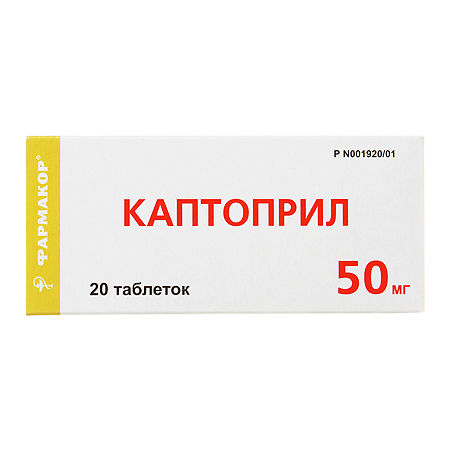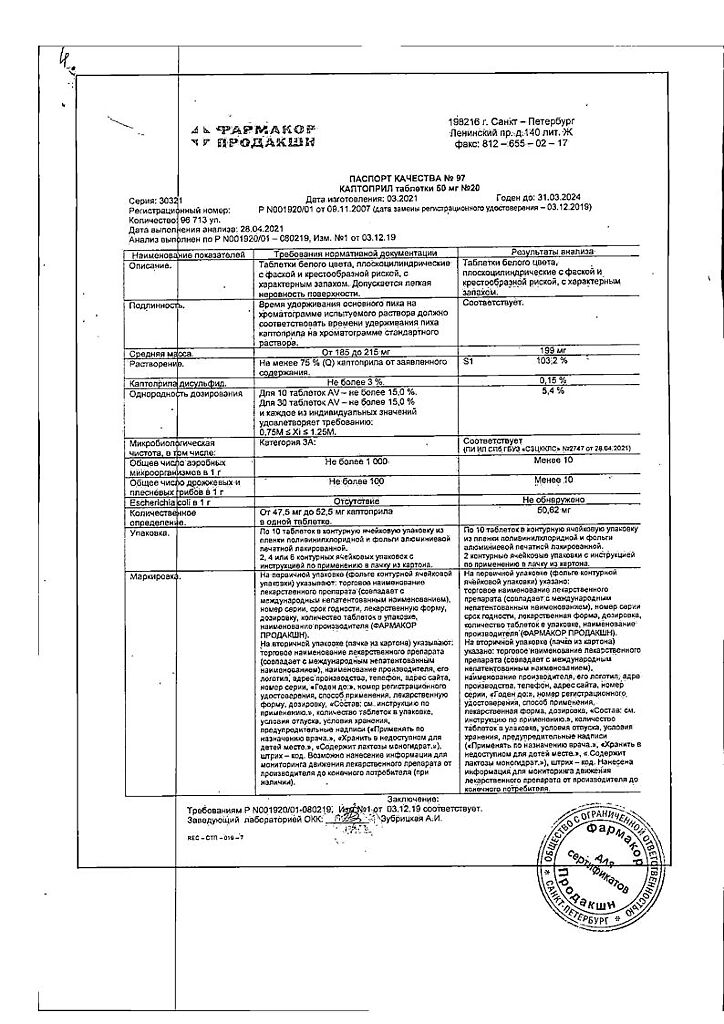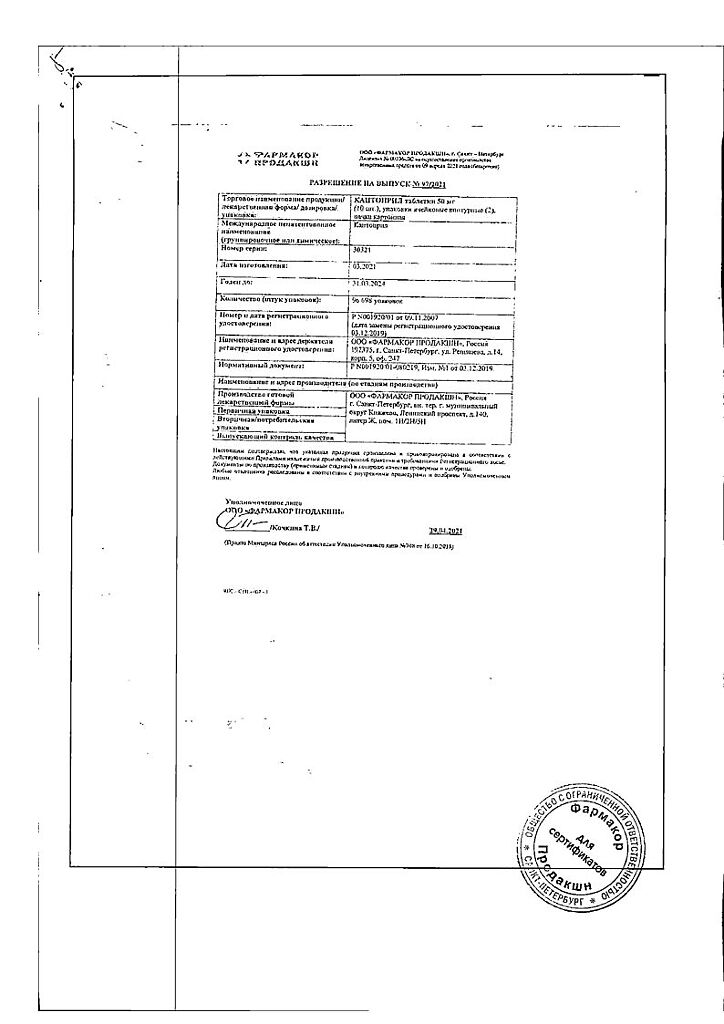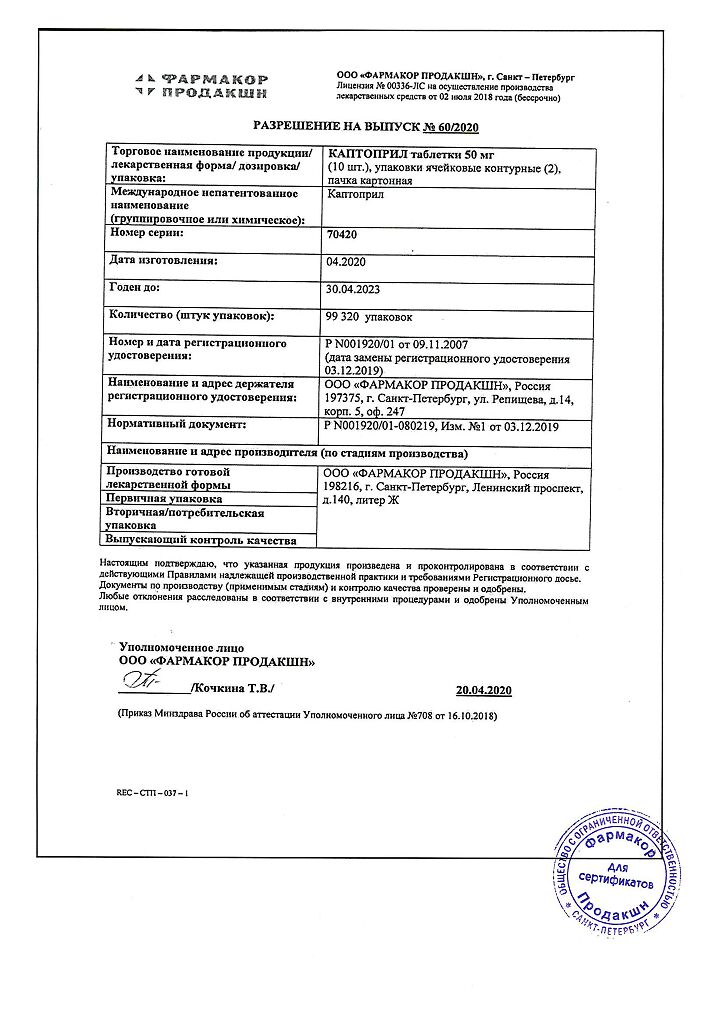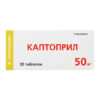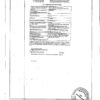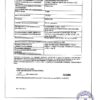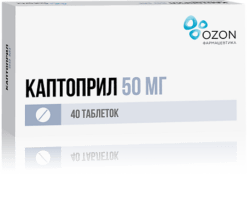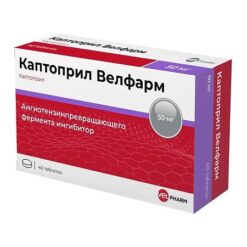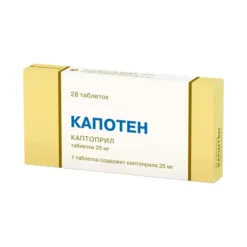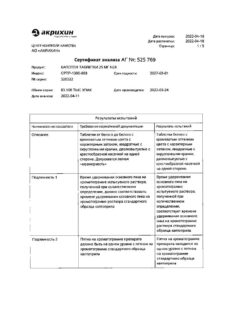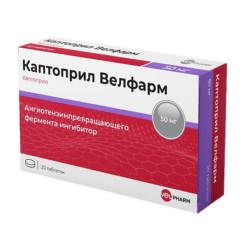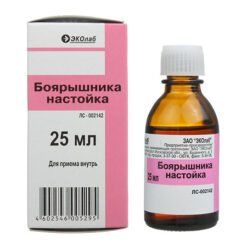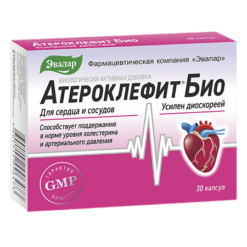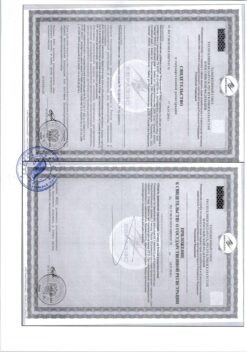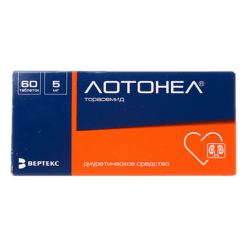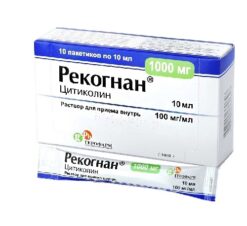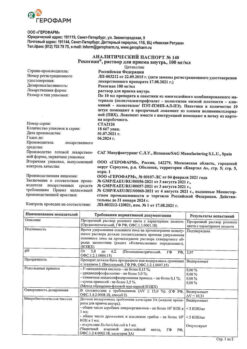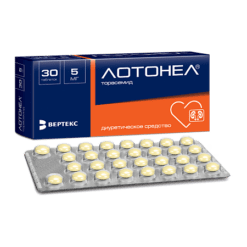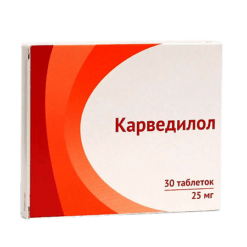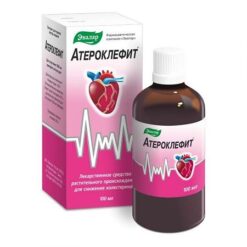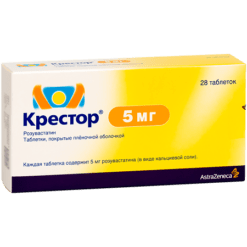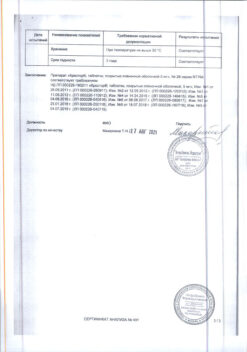No products in the cart.
Captopril, tablets 50 mg 20 pcs
€1.00
Out of stock
(E-mail when Stock is available)
Description
Captopril is a competitive inhibitor of angiotensin-converting enzyme, an enzyme that promotes the conversion of angiotensin I into angiotensin II.
The drug has antihypertensive effects, decreases total peripheral vascular resistance (afterload), preload and pulmonary vascular resistance; it increases cardiac output and exercise tolerance.
Long-term use decreases severity of left ventricular myocardial hypertrophy, prevents progression of heart failure and slows development of left ventricular dilatation.
Pharmacokinetics
Intake
After oral administration, at least 75% of the dose taken is rapidly absorbed from the gastrointestinal tract. Cmax in plasma is reached after 1 h. Simultaneous intake of food slows down absorption of the drug by 30-40%.
Distribution
The binding to blood proteins is 25 – 30%.
Elimination
The T1/2 is less than 3 hours. More than 95% of the drug is excreted in the urine, 40-50% unchanged, the rest as metabolites.
Pharmacokinetics
In special clinical cases fT1/2 is increased in renal failure.
Indications
Indications
Active ingredient
Active ingredient
Composition
Composition
Active ingredient:
50 mg captopril.
How to take, the dosage
How to take, the dosage
Captopril is prescribed one hour before meals. Dosing regimen is determined individually.
In arterial hypertension: The drug is prescribed in an initial dose of 25 mg 2 times a day. If necessary, the dose is gradually (at intervals of 2-4 weeks) increased until the optimal effect is achieved.
– If mild or moderate arterial hypertension the usual maintenance dose is 25 mg twice a day; the maximum dose is 50 mg twice a day.
– If severe arterial hypertension the maximum dose is 50 mg 3 times a day. The maximum daily dose is 150 mg.
For the treatment of chronic heart failure, Captopril is prescribed in cases when the use of diuretics does not provide an adequate effect. The average maintenance dose is 25 mg 2-3 times a day. Further, if necessary, the dose is gradually increased (at intervals of at least 2 weeks). Maximum dose is 150 mg per day.
Application in patients with renal impairment In patients with renal impairment with moderate renal impairment (creatinine clearance of at least 30 ml/min/1.73 m 2 ) Captopril can be prescribed in a dose of 75-100 mg/day. In more severe renal function impairment (creatinine clearance less than 30 ml/min/1.73 m 2 ) the initial dose should be no more than 12.5-25 mg/day; thereafter, if necessary, the captopril dose is gradually increased at long enough intervals, but a lower than usual daily dose of the drug is used.
Interaction
Interaction
Diuretics and vasodilators (e.g., minoxidil ) potentiate the hypotensive effect of Captopril.
When captopril is used together with indomethacin (and possibly with other non-steroidal anti-inflammatory drugs), a decrease in the hypotensive effect may be observed.
The hypotensive effect of Captopril may be delayed when administered to patients receiving clonidine.
Simultaneous use with potassium-saving diuretics or potassium preparations may lead to hyperkalemia.
Concomitant use of lithium salts may increase serum lithium concentrations. The use of captopril in patients taking allopurinol or procainamide increases the risk of neutropenia and/or Stevens-Johnson syndrome.
The use of captopril in patients taking immunosuppressants (e.g., cyclophosphacin or azathioprine) increases the risk of hematological disorders.
Special Instructions
Special Instructions
Renal function should be monitored before initiation as well as regularly during treatment with Captopril.
In chronic heart failure, the drug should be used under close medical supervision.
Captopril is used with extreme caution in patients with diffuse connective tissue disease or systemic vasculitis; patients receiving immunosuppressants, especially in the presence of impaired renal function (risk of serious infections that cannot be treated with antibiotics). In such cases, peripheral blood counts should be monitored before initiation of captopril, every 2 weeks during the first 3 months of therapy and periodically thereafter.
The drug is used with caution during treatment with allopurinol or procainamide as well as during treatment with immunosuppressants (including azathioprine, cyclophosphamide), especially in patients with impaired renal function.
The likelihood of arterial hypotension during treatment can be reduced if diuretics are discontinued or their dose is significantly reduced 4-7 days before the start of treatment with Captopril. If symptomatic arterial hypotension occurs after taking Captopril, the patient should take a horizontal position with elevated legs.
In case of severe arterial hypotension, a positive effect is noted with intravenous administration of isotonic sodium chloride solution. If angioedema develops, the drug should be withdrawn and close medical observation should be carried out. If the oedema is localized on the face, no specific therapy is usually required (antihistamines may be used to relieve symptoms); if it spreads to the tongue, pharynx or larynx and there is a danger of airway obstruction, epinephrine should be given subcutaneously immediately (0.5 ml dilution 1:1000).
Performance in patients with impaired renal function: Caution is used in patients with a history of renal disease because of the increased risk of proteinuria. In such cases, during the first 9 months of treatment with Captopril, the amount of protein in the urine should be monitored monthly. If the urinary protein level exceeds 1 g/day, it is necessary to decide on the appropriateness of further use of the drug. With caution prescribe Captopril to patients with renal artery stenosis as there is a risk of renal dysfunction; in case of elevated blood urea or creatinine levels, a reduction in Captopril dose or cancellation of the drug may be required.
Contraindications
Contraindications
Side effects
Side effects
Cardiovascular system and blood (hematopoiesis, hemostasis): orthostatic hypotension, tachycardia, neutropenia, agranulocytosis.
Gastrointestinal system disorders: nausea, anorexia, taste disorders, dry mouth.
Mechanical disorders: electrolyte imbalance (especially in patients with renal failure), hyponatremia (with simultaneous use of diuretics).
Allergic reactions: skin rash, itching, erythema, urticaria, photosensitization, vasomotor edema.
Others: dry cough.
Overdose
Overdose
Symptoms: severe arterial hypotension, up to collapse, myocardial infarction, acute cerebral circulation disorder, thromboembolic complications.
Treatment: lay the patient with the lower extremities elevated; measures aimed at restoring blood pressure (increase in circulating blood volume, including intravenous infusion of isotonic sodium chloride solution), symptomatic therapy. Hemodialysis may be used; peritoneal hemodialysis is ineffective.
Similarities
Similarities
Additional information
| Conditions of storage | Store in a dry place, protected from light, at a temperature not exceeding 25 ° C. |
|---|---|
| Manufacturer | Pharmacor Production, Russia |
| Medication form | pills |
| Brand | Pharmacor Production |
Other forms…
Related products
Buy Captopril, tablets 50 mg 20 pcs with delivery to USA, UK, Europe and over 120 other countries.

